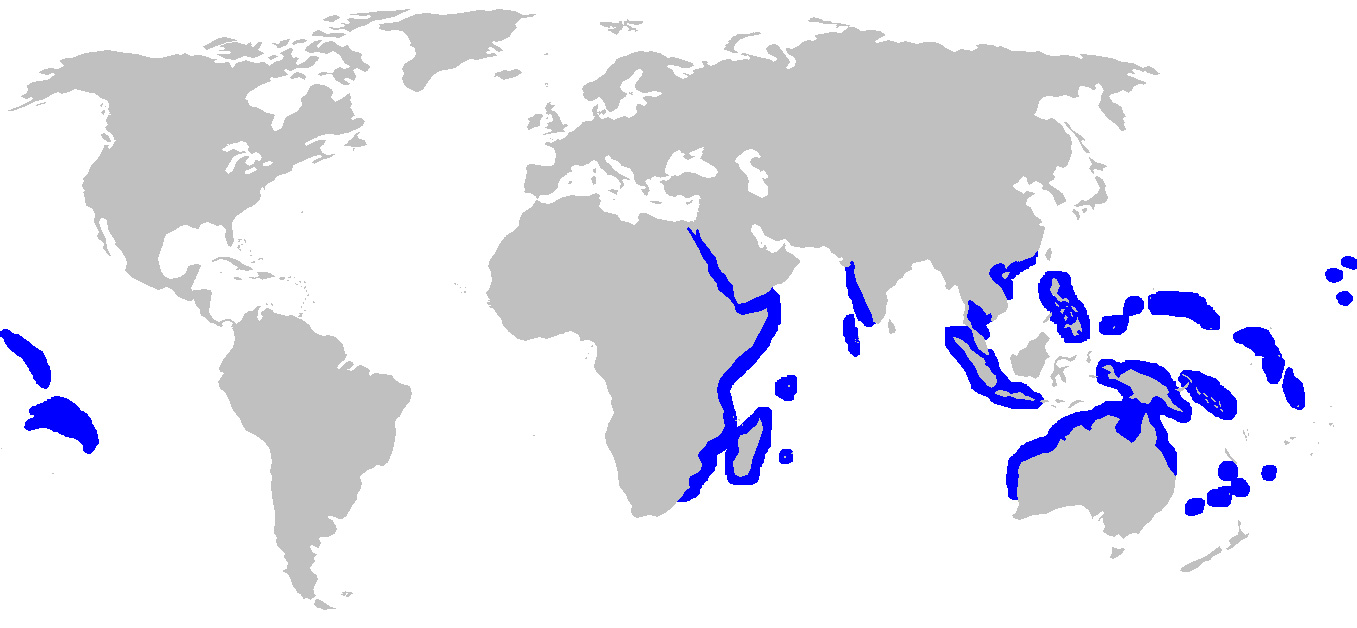
Animal description
The Grey Reef Shark (Carcharhinus amblyrhynchos) is a striking species of requiem shark, belonging to the family Carcharhinidae. It is a sleek and powerful predator that thrives in the warm, shallow waters of the Indian and Pacific Oceans, from the Red Sea and East Africa to Easter Island and from South Japan to New Caledonia. This shark is often found near coral reefs, which serve as its primary habitat, providing both food and protection.Characterized by its slender, streamlined body, the Grey Reef Shark typically measures around 1.9 meters (6.2 feet) in length, although some individuals can grow up to 2.5 meters (8.2 feet). It weighs approximately 33 kilograms (73 pounds). Its dorsal surface is a distinctive gray color, which seamlessly blends into the oceanic environment, while its ventral side is a stark white, providing camouflage from both prey and predators. This coloration is a classic example of countershading, a common form of camouflage in marine animals.
One of the most distinguishing features of the Grey Reef Shark is its rounded snout coupled with large, black-edged fins, especially the first dorsal fin and the pectoral fins, which are conspicuous against its lighter body. It has large, circular eyes equipped with nictitating membranes, protective third eyelids that sweep horizontally to protect the eyes from damage and debris.
Grey Reef Sharks are highly social creatures, often found in large schools during the day, particularly near prominent reef drop-offs and seamounts. These aggregations are thought to be largely for reproductive purposes, although they also offer enhanced protection against predators. At night, they disperse to hunt alone, preying on a variety of fish, cephalopods, and crustaceans. Their acute senses, including olfaction, hearing, and the unique ability to detect electrical fields produced by other organisms, make them formidable hunters.
Reproduction in Grey Reef Sharks is viviparous, meaning the sharks give birth to live young rather than laying eggs. After a gestation period of about a year, a female shark can give birth to a litter ranging from one to six pups. These young sharks are born fully formed and are capable of fending for themselves from birth, although they tend to remain in shallow, protected waters to avoid predation by larger sharks, including their own species.
Despite their fearsome reputation, Grey Reef Sharks are generally wary of humans and are considered to be of low danger unless provoked. However, their population is declining due to a combination of factors, including overfishing, habitat destruction, and the shark fin trade. They are currently listed as Near Threatened by the International Union for Conservation of Nature (IUCN), highlighting the need for conservation efforts to protect these magnificent creatures and their habitats.
In summary, the Grey Reef Shark is a remarkable species that plays a crucial role in the marine ecosystem. Its sleek design, social behavior, and hunting prowess make it one of the ocean's most interesting inhabitants. As with many marine species, understanding and protecting the Grey Reef Shark is essential for maintaining the biodiversity and health of coral reef ecosystems around the world.
Map of occurrence

Similar Animals
New photos of animals
Top 10 animals
- Dolphin gull (Leucophaeus scoresbii)
- Diana monkey (Cercopithecus diana)
- Moustached guenon (Cercopithecus cephus)
- Galápagos tortoise (Geochelone nigra complex)
- Stone loach (Barbatula barbatula)
- Japanese macaque (Macaca fuscata)
- Greek tortoise (Testudo graeca)
- Russian tortoise (Testudo horsfieldii)
- Common flying dragon (Draco volans)
- Galápagos penguin (Spheniscus mendiculus)


